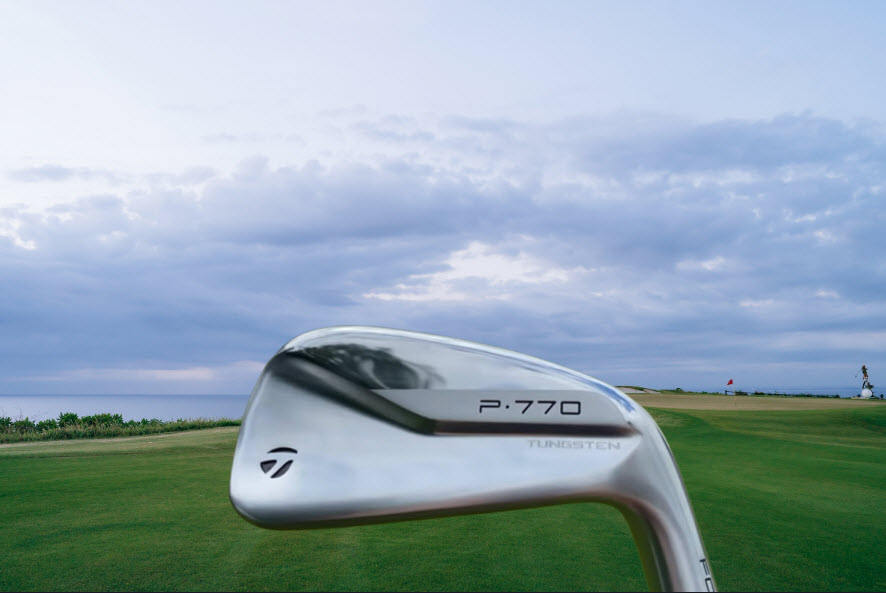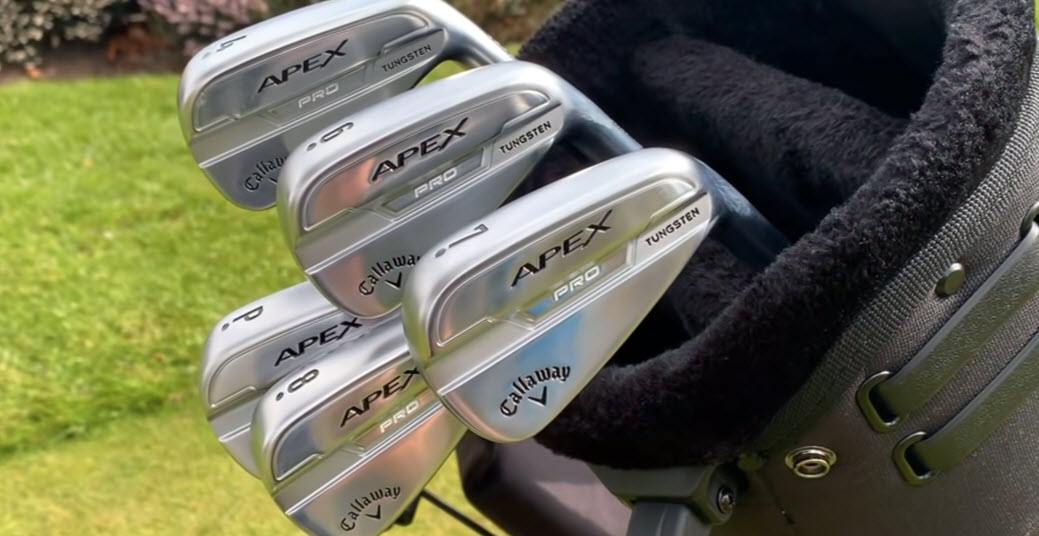Forged Vs Cast Irons
Ah yes, the question as old as time itself - forged vs cast irons. We often hear this whenever looking up reviews of golf clubs. [no_toc]
We also tend to see that a particular club’s sport “Forged Iron feels in them” or that certain clubs are “iron cast to perfection!” or something to that effect.
For most people, especially novice golfers, these seem nothing but sales talk aimed at buyers who care about having something to brag about.
Professional golfers though, or those who know their stuff, know that how a golf club is made makes a big difference in how well it performs on the course.
More than just selling points for aesthetics, the difference between forged and cast clubs can mean success or failure for the golfer using them.
That’s why, in this article, we’ll go over the main differences between forged and cast irons, each of their pros and cons, and what they can offer for your game’s performance overall:
Related: 10 Best Golf Irons For 2022
What are the main differences between Forged Irons vs Cast Irons?
Generally, golfers tend to get more feedback from forged iron. This is because forged construction offers less weight displacement than cast irons. Forged iron club heads also tend to be more compact.
In cast irons, there’s a slight possibility of a difference in density in the metal as it dries, though it should be noted that advancements in pouring technology have largely eliminated this possibility.
With that being said, the feel overall comes from the compact shape and design of the club head.
Although there’s no apparent difference in the distance offered by either type of golf club, cast irons tend to have more loft than their forged iron counterparts. A #6 forged iron, for instance, would have the same loft as a #5 cast iron club.
Cast irons tend to be more forgiving than forged irons.
This is likely because forged iron clubs usually have smaller club heads, making them more suited for professional players but less suited to compensate for inaccurate strikes.
Forged irons tend to provide more distance control.
This is because the grains of the metal are more firmly bound, and more packed-in With cast irons, clubs are more prone to the unfavorable springing affect – the casting process consists of tiny air bubbles that might cause the clubface to spring.
With all that considered, all the tests done to show the difference in distance control in both types have only shown very marginal results. This means that you can get one or the other and not be too worried about it.
Surprisingly enough, forged irons, despite being more expensive than cast irons, are more likely to rust and tarnish over time. This is because manufacturers tend to use softer metals. Cast irons are more durable in that regard.
It’s the weight placement, groove depth, and loft angle of a golf iron that affects factors like launch, spin, and trajectory. When it comes to which type offers the most of these, there’s no palpable difference.
What Are Cast Irons?

The crafting of cast irons is much easier since molten metals are more pliable. This means cast iron metals are more widely produced than forged irons. They also tend to be much cheaper, being easier on the pocket, especially if you’re only starting in the game.
Cast irons (also considered game improvement irons) are created with whole molten metal being poured into the mold.
This is beneficial in that it allows the manufacturers to incorporate additional components, such as cavities and perimeter weighting.
Some can even mix other ingredients into the molten metal to make the finished product stronger or more rust-resistant.
Cavity-back irons are cast golf irons with more recent innovations that are not supported by their more traditional forged sibling.
This development makes cast irons far more forgiving, ensuring impact even with players who make mishits or have poor form.
Game improvement irons are what cast irons are more popularly known as.
The name (game improvement iron) hints at these clubs’ ability to improve the game of novices and get lower handicaps.
Many high handicappers have managed to get into a mid-handicap range thanks to their very forgiving cast clubs (game improvement clubs).
Related: How Do Golf Handicaps Work?
Why use Cast Irons?
If you’re a beginner at the sport of golf and are just starting to get the hang of the sport, then cast irons are the best.
They are relatively cheap and much easier to come by. Since you’re likely practicing your swing and learning how to control your shots, a forgiving and cost-effective set of game improvement irons would be a great learning tool.
You can always invest in more expensive equipment, later on, if you feel you need it.
Beginners, high handicappers, seniors, and, to a certain extent, even mid handicappers can benefit from this type of club.
Since cast irons are so forgiving, those with weaker skills (slow swing speed, high handicap, etc.) benefit the most.
Pros & Cons of Cast Irons
Pros
Cons
A Few Of The Best Cast Irons
Below are a few of the best cast irons we've had the pleasure of testing!
#1 Callaway Mavrik Irons

(Higher Ball Speed, Great Set of Irons for Beginners)
Though these are from 2020, they’re far from dated, proving to be one of the best products that we have ever revealed. They’re so popular that you may even need to substitute the shaft and grip, as high demand makes these parts harder to obtain at times.
What we loved about this set:
- Alloy steel and tungsten construction
- 360 Face Cup
- Artificial intelligence design
Pros & Cons
Here are the Pros & Cons for the Mavrik Irons
Pros
Cons
#2 TaylorMade Sim Max Irons

(Another Great Option for Beginners)
These come in with a significantly more affordable price range. Because of this – and many other features – these irons are more likely to end up in the club bag of a more casual player. While lower in price, they’re far from cheap in construction, with TaylorMade products being some of the best on the market.
What We Love About This Set:
- Speed Bridge technology
- Ultra-Thin 1.5mm face design
Pros & Cons
Here are the Pros & Cons for the Sim MaxIrons
Pros
Cons
#3 TaylorMade Sim 2 Max Irons

(Yet another Great Set of Irons for Beginners)
The TaylorMade Sim Max irons that we discussed earlier are fantastic, easy-to-use clubs for golfers of any level. But what if you tried these clubs and found yourself wanting more?
Their updated model, the Sim 2 Max Irons are a great set to switch to if you like the feel of the Sim Max irons but want something that can offer a little more to your game.
These titanium clubs have a new “Cap Back Design” that helps utilize its high-strength steel and lightweight polymers. The new design aims to maximize distance with an extremely low center of gravity and provide a more forgiving swing. The “fast forgiving face” design also helps to minimize the consequences of poor swings or mistakes.
What we loved about this set:
- Titanium construction
- Thru-Slot Speed Pocket technology
- Forgiveness-focused face design
- ECHO Damping System to fend off harsh vibrations
Pros & Cons
Here are the Pros & Cons for the Sim2 Max Irons
Pros
Cons
What are Forged Irons?
As stated above, forged irons are made by taking a solid piece of metal that is then stamped to form the required, correct shape and loft.
The benefit of this method is that it enhances consistency from one golf iron to another and offers far more desirable distance control.
It can also deliver a pure vibrational feel at the time of impact making for a much better club head feel than its cast-iron alternative.
Forged irons usually have a muscle-back or blade construction. This means the club heads of forged irons are compact with sleek lines. More commonly than not, softer steel is used with more carbon to improve its overall workability.
Ultimately, the feedback, responsiveness, and feel are the most loved qualities of the forged irons.
All this along with the fact that they hand over exceptional ball control because of their more compact, smaller head size.
Being more complicated to make, forged irons are often considered to be the way golf clubs are traditionally supposed to be made.
In the forging process, the club head bends easily and it also becomes easier to adjust the loft and lie angles. That means forged irons are the ideal choice for those looking to get a custom-fit forged set, making them prized possessions of experienced golfers.
It also goes without saying that all this makes forged irons quite expensive.
Many cast iron clubs are marketed as having that forged iron feel but are, at the end of the day, still cast iron clubs.
The material used in crafting it, the technology used by the manufacturers, and the fact that it’s generally the favored type of club among golfing professionals, all contribute to the price of forged irons.
That being said, Forged irons are an investment you’re likely never going to regret.
Why use Forged Irons?
Those who use forged irons tend to be of the professional class of golfers, those with mid to low-handicap range. This is why forged irons and iron sets are also known as player’s clubs.
The compact size of the cub head means that, although more accurate and powerful, it does little for forgiveness. Forged clubs work best in the hands of an experienced player who knows how to aim and swing.
Pros & Cons of Forged Irons
Pros
Cons
A Few Of The Best of Forged Iron Clubs
Here are, in my opinion, 3 of the best forged irons you can buy today!
#1 Choice: Callaway Apex Pro Irons

(Best Suited for Beginning to Intermediate Golfers)
First on our list is the pro set for Callaway Golf, the Apex Pro Iron Set. One thing to mention right off the bat is that these are the 2021 model, making them incredibly recent. While there hasn’t yet been a 2022 model, the Callaway Apex Pro Irons excel at everything you’ll need.
What We Love About Them:
- Great Design – honestly, we love it! The Callaway Irons’ ability to offer consistently decent distance and impact with every use.
- True Temper Elevate 95 Shaft- Apex Pro Irons that we have to rave about is their shafts. These shafts are versatile enough to provide optimal swings no matter the scenario, leading to a great flight.
- The lightweight hollow body was nice
Pros & Cons
Here are the Pros & Cons for the Apex Pro Irons
Pros
Cons
#2 Taylormade P790 Irons

These 2021 clubs are heavily customizable as well, giving you the choice of graphite or carbon steel for your shafts. The flex can go between regular or stiff to help your clubs fit your preferences as well as possible.
What we loved about this set:
- SpeedFoam Air
- Thinner wall construction
- Tungsten mass
- Low center of gravity
- Thru-Slot Speed Pocket
Pros & Cons
Here are the Pros & Cons for the Taylormade P790 Irons
Pros
Cons
#3 TaylorMade P770 Irons

(Great for Intermediate to Professional Players)
Sticking with TaylorMade for our third item, the Taylormade P770 Irons are another fantastic set. However, this particular item doesn’t have all of the same customizations that the previous entry has. Because of this, you should expect to need to adjust to the club rather than customizing it to fit your game.
What We Love About This Set:
- Wrap grip
- Stiff flex
Pros & Cons
Here are the Pros & Cons for the Taylormade P790 Irons
Pros
Cons
Closing thoughts…
Forged irons and cast irons both have their own set of pros and cons. Neither can be objectively better than the other. Instead, each has its purpose depending on the player and where he/she is in terms of skill.
Cast irons are great for beginners but forged irons are the clubs likely to get you to a lower handicap.
If you're still not sure how to choose the right golf irons for your game, then have a look around our website as we review tons of them, and feature only the best.
When all is said and done though, practice, determination, and skill are what make a great player. Prioritize on those first and the rest will simply follow!

